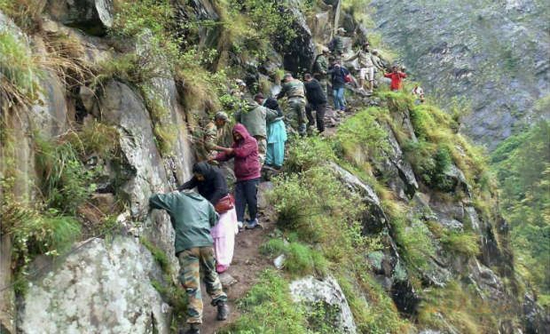
Dehradun, Jun 22: “Take me back, I want to go back.” This was how some survivors of the massive Uttarakhand floods cried in an emotional outburst when they returned on Friday with some member or other of their family or assorted group of pilgrims and tourists not among their midst, after enduring a harrowing five-day ordeal.
As a rescue helicopter touched down on this helipad in the Uttarakhand capital on a sombre, cloudy day in the hills, out stepped a group of five adults and three children.
Among them was a man in his late 30s. His face heavy with sorrow, he burst out crying the moment he disembarked. What was surely a moment of joy for a survivor was starkly not so.
“Take me back, I want to go back... My two children, my wife Rita, my parents are still stranded there with seven others.” That is all Amit Pande of Hardoi in Uttar Pradesh could say before being choked by a fresh spasm of tears.
Everybody has horrifying stories to tell, and it is not just the survivors. For instance, Mansi from Uttar Pradesh’s Saharanpur had come to Sahasradhara accompanied by a family member and two photographs of her sister, brother-in-law and their son posing together. All three are missing.
She had last spoken to her sister on Tuesday, when the latter managed to call on her way down from Kedarnath, the epicentre of the massive floods triggered by heavy monsoon rains.
“They said they have climbed down 4 km on foot, but rescue teams were yet to reach them. They have no food, no water. They mentioned seeing bodies lying around the temple area. Please find them and rescue them,” she could not fight back the tears as she requested a police officer. “I don’t have any other siblings. She is my only sister,” she pleaded.
Sharmilee Jawda, 16, had climbed the hills around Kedarnath with her family members just before the cloudburst hit the valley. There were two children with them — her brothers, one aged 11, another aged eight. “It turned out that we were at a safe height when the boulders came rolling down. Many others, too, managed to reach where we were. We had to remain there two days... no food, no water,” she said.
Asked about the airdropped food packets, she said they could hardly get hold of any; there were too many people. She was brought back on Thursday with her brothers and her mother. Her uncle, who had rushed here from their hometown, was waiting for them when they landed by helicopter.
But her father and other members of their group are yet to reach Dehradun. They have been located and are safe, her uncle Chandrakant said. “They should arrive here shortly,” he was confident. The ordeal then seems over for this family. But scars will remain. “What did you see after things quietened down?” Sharmilee was asked in her room at the Jolly Grant hospital, close to the airport. “What could one have seen after all that destruction?” was her retort.
At the Doon Hospital, talking to Raj Kishore Trivedi, one knows exactly what the young Sharmilee means. Trivedi was the owner of a souvenir shop which stood right outside Kedarnath temple. Like much else in that area, his establishment is now a mound of slush and rubble. He survived with a broken leg.
On his hospital bed, it was not so much a survivor one saw as a man lost in thoughts, responding absently to questions of his and his family members’ well-being. They are all well and safe though, he confirmed. What is uncertain is the future.






Comments
Add new comment